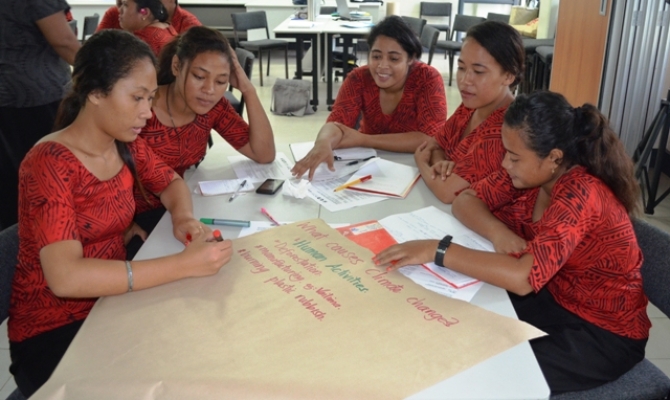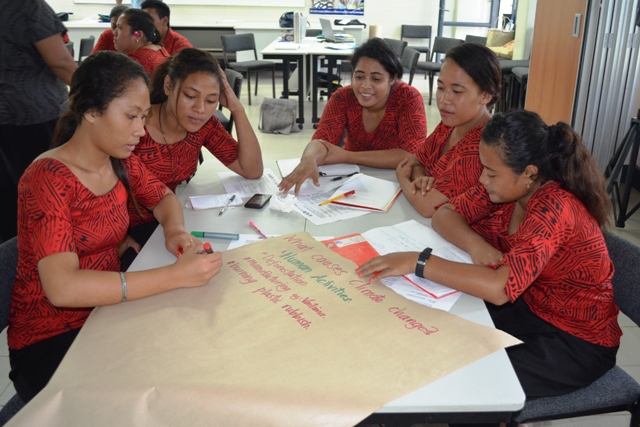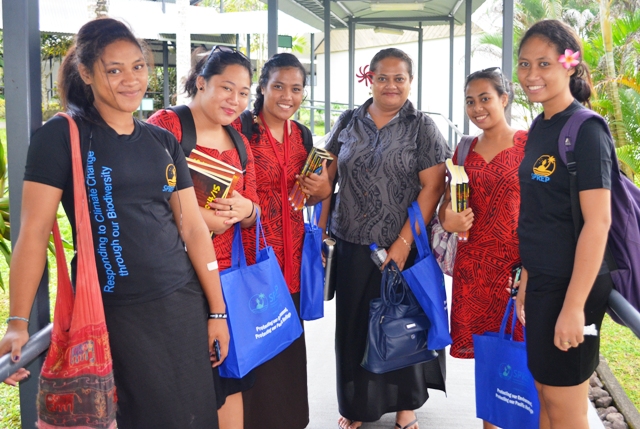
Climate Change Resilience
Over 20 journalism students from the National University of Samoa spent the day learning about climate change and disaster risk management to strengthen their environment reporting skills.
Held at the Secretariat of the Pacific Regional Environment Programme (SPREP) the training is part of a capacity building activity under a project to build the resilience of Pacific island broadcasters to climate change and disasters.
Called the Pacific National Broadcasters Climate and Disaster Resilience Plan, this project is funded by the Pacific Assistance Media Scheme (PACMAS) and implemented by SPREP in partnership with the Secretariat of the Pacific Community. One of the components of this project is to provide training on climate change and disaster risk management to help enhance the reporting skills of Pacific journalists in these areas.

"We're always pleased to have students from the media and journalism school of the NUS here at our SPREP compound, while this is an annual event it is an indication of our strong partnership and commitment to building the capacity of our budding journalists. We were happy to have an added twist this year," said Ms. Nanette Woonton, the Media and Public Relations Officer of SPREP.
"We're supporting an initiative of the school to print journals of news stories developed by the reporters from our training activities, and we're also going to present awards to the top three student reporters. We're really excited by this!"
The one day training saw a number of different activities take place starting with a presentation from Lagipoiva Cherelle Jackson, a specialist in environment and climate change reporting, who helped set the scene for the day.
There was also an interactive session learning about climate change led by Pipi Penimina Leavai, the Pacific Adaptation to Climate Change Project Coordinator which saw students carry out group work and learning activities.

The Samoa Meteorological Service and the Samoa Disaster Management Office also presented during the one day event that saw the students refine their story plans, obtain interviews and conduct research.
"This was an excellent opportunity for the students to learn about these key areas. It is also really good to hear from the local expertise in these fields so our students can start building their networks for when they graduate and become part of the journalism workforce," said Misa Vicky Lepou, Senior Lecturer of the NUS Media and Journalism School.
"We now look forward to the stories that will come from our training with SPREP and the journal that we will be releasing."
The training was facilitated by Ms. Leilani Curry of SPREP, it is planned that the journals will be ready for launch by the end of May.
The National Broadcasters Climate and Disaster Resilience Plan Project is implemented in Cook Islands, Kiribati, Palau, Samoa, Solomon Islands, Tonga, Tuvalu and Vanuatu. It aims to develop Climate and Disaster Resilience Plans for broadcasters as well as build capacity to report on these issues.
Held at the Secretariat of the Pacific Regional Environment Programme (SPREP) the training is part of a capacity building activity under a project to build the resilience of Pacific island broadcasters to climate change and disasters.
Called the Pacific National Broadcasters Climate and Disaster Resilience Plan, this project is funded by the Pacific Assistance Media Scheme (PACMAS) and implemented by SPREP in partnership with the Secretariat of the Pacific Community. One of the components of this project is to provide training on climate change and disaster risk management to help enhance the reporting skills of Pacific journalists in these areas.

"We're always pleased to have students from the media and journalism school of the NUS here at our SPREP compound, while this is an annual event it is an indication of our strong partnership and commitment to building the capacity of our budding journalists. We were happy to have an added twist this year," said Ms. Nanette Woonton, the Media and Public Relations Officer of SPREP.
"We're supporting an initiative of the school to print journals of news stories developed by the reporters from our training activities, and we're also going to present awards to the top three student reporters. We're really excited by this!"
The one day training saw a number of different activities take place starting with a presentation from Lagipoiva Cherelle Jackson, a specialist in environment and climate change reporting, who helped set the scene for the day.
There was also an interactive session learning about climate change led by Pipi Penimina Leavai, the Pacific Adaptation to Climate Change Project Coordinator which saw students carry out group work and learning activities.

The Samoa Meteorological Service and the Samoa Disaster Management Office also presented during the one day event that saw the students refine their story plans, obtain interviews and conduct research.
"This was an excellent opportunity for the students to learn about these key areas. It is also really good to hear from the local expertise in these fields so our students can start building their networks for when they graduate and become part of the journalism workforce," said Misa Vicky Lepou, Senior Lecturer of the NUS Media and Journalism School.
"We now look forward to the stories that will come from our training with SPREP and the journal that we will be releasing."
The training was facilitated by Ms. Leilani Curry of SPREP, it is planned that the journals will be ready for launch by the end of May.
The National Broadcasters Climate and Disaster Resilience Plan Project is implemented in Cook Islands, Kiribati, Palau, Samoa, Solomon Islands, Tonga, Tuvalu and Vanuatu. It aims to develop Climate and Disaster Resilience Plans for broadcasters as well as build capacity to report on these issues.